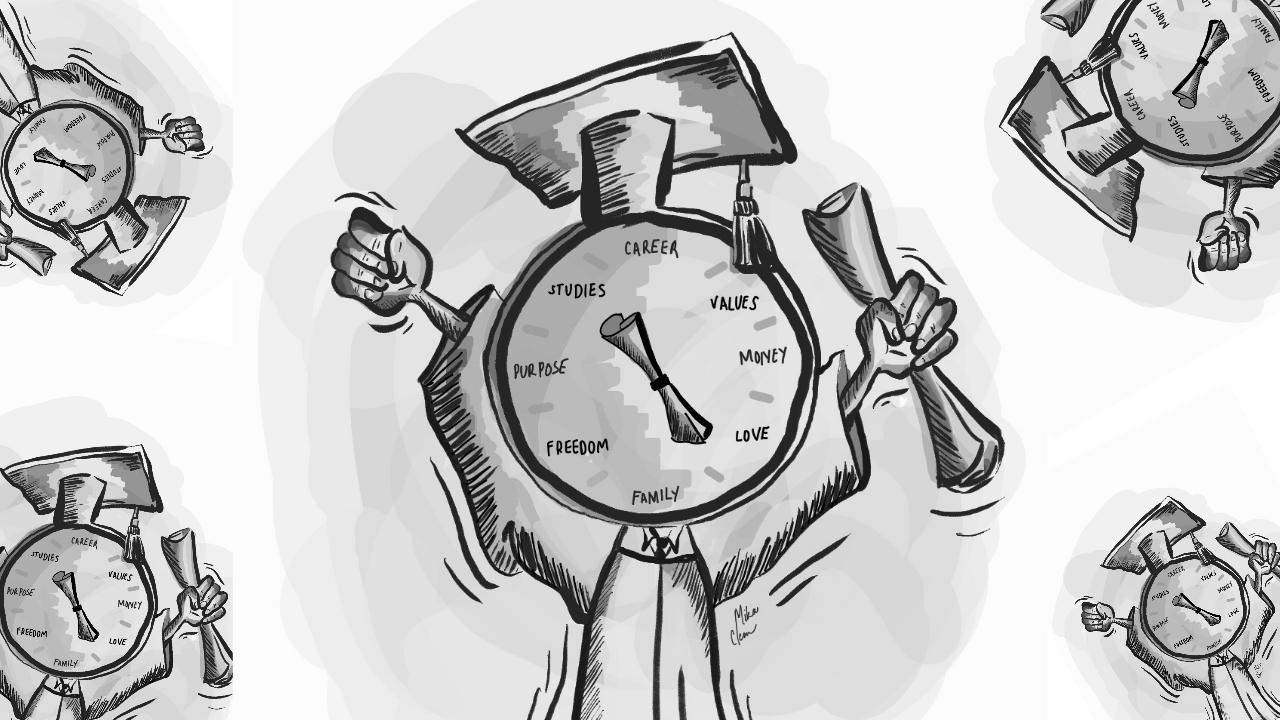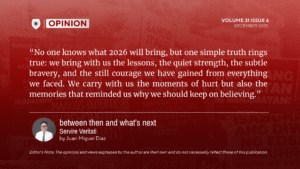By The Bedan Herald| April 9, 2022
Tick Tock on the Social Clock
“WHAT are your plans after graduation?” Truth be told, Batch 2022 will set its foot in the real world in just a few months. But what is the real world? Is it a social construct passed down to us or is it the reality of life the way it is. With that, they are clouded with rhetorical questions, left and right, from the people that surround them about what they are going to do after they graduate. Raise a family? Review for the board exams? Become a corporate slave? Rest for a while? The possibilities are endless for young adults like us but why does it seem like there has to be the next route after we finish our journey?
As a collective society, there is an emphasis on familial relations — being one with the community. The generational baggage was set forth to the majority, as other people’s expectations clash with the individual’s way of life. There seems to be an invisible string that controls us, we act as if we are marionette dolls in society and pawns in the eyes of many. Time is ticking, they say, but the truth is, the time of our lives is in our own hands, not in others’. In the 1960s, social psychologist Bernice Neugarten introduced the idea of the ‘social clock,’ when she noticed that life events seem to be predictable following the standards set and bound by our construct. She believed that all have their variations of the social clock, whether it is conscious or unconscious, which drives them to think that they have to achieve something according to this “omnipotent” timetable.
Upon reading the first few lines, did it make you think what your next step would be after receiving your hard-earned diploma? Most, if not all, are probably thinking about whether they should review for the board examinations, especially those from the degrees that need professional licensures to further their craft. Another expectation set is to become one of the providers because the culture entails the idea of ‘utang na loob’ or embedded gratitude that needs to be paid as if it is a debt. The breadwinners of the family, the firstborns — the family dynamics that have set paths for its members. The societal, familial acceptance we get is enough to lift us, but, will there be a time it will bring us down?
Unlike Western countries, our culture is not that keen on the idea of a “gap year.” Right after high school, one must fulfill a four or five-year major. It’s the norm, they say. The community is not open to deviance or what sets the individual apart from others. The concept seems vague because not everyone is open to the idea of “wasting” one’s precious years that is allocated for education. Education is indeed the key to success, but it is not the only thing that measures success. After all, we are wired to work hard in achieving our goals, but the thing about their vision of our success is that they have to have a say in it.
Is there anything we can do to the timeline? It is not something like the infinity stones from the Marvel franchise. We cannot go back in time or in the future because the present is something that we can control. Hannah Pangilinan’s podcast, ‘Pause Cast,’ perfectly summed up what this invisible clock is which mostly affects women because of the expectations the society has set for them such as having a husband and raising a child at a certain age, getting a master’s degree, and the like. In the episode, ‘Can I turn this pressure into power?’ Pangilinan and Bianca Gonzales delved into the topic. Gonzales admitted that she conformed to the “timeline,” as someone in the public eye for quite some time. A lot of people felt like they had a say in her life. When she had her firstborn, some were asking, will there be a second child? However, she doesn’t encourage people to follow the expectations set by other people, other than themselves. We are not puppets for others to control. It may sound simple, something that is encouraging, but it has long-term drastic effects on one’s wellbeing.
They say numbers do not define oneself, but the way our ages have to accompany certain life events, retrospectively, says a lot about the expectations set to us by our environment. Human beings are complex and oftentimes, there is some sort of epiphany that we experience. We tend to picture ourselves in the future that is “handed down” to us, instead of embarking on our self-discovery. All these life transitions are geared towards adulthood, a phase in our lives where everything is new and exhilarating. Though the concept is not generally evident for all people, when you think of the set expectations that others set for you, it will leave you questioning, “When will it be my turn?” to decide for your own OR to adhere to whatever milestone they think is best for you.
Latest Articles
Volume 27 | Issue 6




